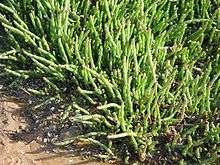Sarcocornia quinqueflora
| Beaded samphire | |
|---|---|
 | |
| Sarcocornia quinqueflora at Ricketts Point Marine Sanctuary | |
| | |
| at Sydney Olympic Park | |
| Scientific classification | |
| Kingdom: | Plantae |
| (unranked): | Angiosperms |
| (unranked): | Eudicots |
| (unranked): | Core eudicots |
| Order: | Caryophyllales |
| Family: | Amaranthaceae |
| Subfamily: | Salicornioideae |
| Genus: | Sarcocornia |
| Species: | S. quinqueflora |
| Binomial name | |
| Sarcocornia quinqueflora (Bunge ex Ung.-Sternb.) A.J.Scott | |
Sarcocornia quinqueflora, commonly known as beaded samphire, bead weed, beaded glasswort or glasswort,[1] is a species of succulent halophytic coastal shrub. It occurs in wetter coastal areas of Australia and New Zealand.
Description
It grows as an erect perennial up to 50 centimetres high.[2][3]
Taxonomy
It was first published as Salicornia quinqueflora in 1866, but transferred into Sarcocornia when that genus was erected in 1977.[4]
Distribution and habitat
It occurs in south west and south east Australia, and also in parts of the Nullarbor Plain, and part of the east coast of Cape York Peninsula.[2]
In New Zealand it's found mostly on the shoreline in regions throughout the North Island. In the South Island S. quinqueflora is widespread on the east coast, but isn't found on the west coast.[5]
References
- ↑ "Beaded Glasswort". Victorian Resources Online. Department of Primary Industries (Victoria). Retrieved 2011-12-28.
- 1 2 Wilson, Paul G. "Chenopodiaceae". Flora of Australia. IV. p. 278.
- ↑ "Sarcocornia quinqueflora (Ung.-Sternb.) A.J.Scott". FloraBase. Western Australian Government Department of Parks and Wildlife.
- ↑ "Sarcocornia quinqueflora (Ung.-Sternb.) A.J.Scott". Australian Plant Name Index (APNI), IBIS database. Centre for Plant Biodiversity Research, Australian Government.
- ↑ Zimer, Eduart (September 2007). "Succulent plants from down under – Sarcocornia quinqueflora – an odd succulent halophyte" (PDF). fileden.com. Retrieved 2012-05-20.
External links
| Wikimedia Commons has media related to Sarcocornia quinqueflora. |